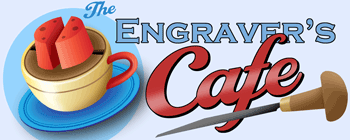You are using an out of date browser. It may not display this or other websites correctly.
You should upgrade or use an alternative browser.
You should upgrade or use an alternative browser.
Albrecht Durer's Great Lettering Instructions
- Thread starter mdengraver
- Start date
Tim Wells
~ Elite 1000 Member ~
That is a cool find there. Thanks for posting that, it helps feed my lettering fetish... I'm sick like that...
Chapi
Elite Cafe Member
Wow, that's really something. Its a little mind boggling to think that there is that work that goes into constructing each letter properly, and also a little embarrassing when you read the introduction about how glaringly obvious it is when someone doesn't do this and hasn't been trained properly. I'm glad Mr. Dürer wrote this stuff down.
CJ Tate
Elite Cafe Member
Thank you for putting link up. Facinating to see the process. Great information
Arnaud Van Tilburgh
~ Elite 1000 Member ~
Thank tou for the link
arnaud
arnaud
Andrew Biggs
Moderator
That is a very nice and historical document thank you Mdengraver.
But I wouldn't get to carried away with the formula thing. In reality no-one ever lays out letters like that because it is too slow and mechanical. Maybe someone designing a font from scratch but that would be about it. I doubt if even the Romans laid out lettering like that.
There are also things in there that would be considered wrong when lettering today, and I'm not sure they were even right at the time of writing.
When using capitol letters the rounded letters like C-G-O-Q etc all have to go slightly above and below the lines. If you do not do that then those letters will give the optical illusion of being smaller than the other letters, even though they are in fact mechanically the same size.
It is also standard practice to make the capital "S" have a smaller top and the bottom slightly larger. If you do not do this and make them both even then the "S" looks like it is falling over to the right. Have a look at Durer's "S" and you will see what I mean.
There are styles where these things don't apply but they tend to be more modern square sans serif (block) styles.
The big thing with any style of lettering is consistency in stroke width, height, slant, proportion, correct spacing etc.
If you are interested in lettering I would highly recommend the old Speedball books or some very basic books on lettering that show you all the rules that apply. There aren't all that many rules but they are important ones that have been tried and tested for hundreds of years and still apply to this day. A lot of the calligraphy books are not very good as they are to fancy and more advanced.
And one golden rule when lettering.....................never, never, never, trust computer generated spacing (kerning).
Cheers
Andrew
But I wouldn't get to carried away with the formula thing. In reality no-one ever lays out letters like that because it is too slow and mechanical. Maybe someone designing a font from scratch but that would be about it. I doubt if even the Romans laid out lettering like that.
There are also things in there that would be considered wrong when lettering today, and I'm not sure they were even right at the time of writing.
When using capitol letters the rounded letters like C-G-O-Q etc all have to go slightly above and below the lines. If you do not do that then those letters will give the optical illusion of being smaller than the other letters, even though they are in fact mechanically the same size.
It is also standard practice to make the capital "S" have a smaller top and the bottom slightly larger. If you do not do this and make them both even then the "S" looks like it is falling over to the right. Have a look at Durer's "S" and you will see what I mean.
There are styles where these things don't apply but they tend to be more modern square sans serif (block) styles.
The big thing with any style of lettering is consistency in stroke width, height, slant, proportion, correct spacing etc.
If you are interested in lettering I would highly recommend the old Speedball books or some very basic books on lettering that show you all the rules that apply. There aren't all that many rules but they are important ones that have been tried and tested for hundreds of years and still apply to this day. A lot of the calligraphy books are not very good as they are to fancy and more advanced.
And one golden rule when lettering.....................never, never, never, trust computer generated spacing (kerning).
Cheers
Andrew
I think Andrew's advice offers a corrective balance to the Durer post. Andrew's occupation gives him a special point of view.
I as a beginner know I get overly enthusiastic.
"Engraving on Precious Metals" by A Brittain et al. might be more useful for lettering.
And "The Jewelers Engraver's Manual" has valuable info on lettering.
Lettering is my current enthusiasm.
Kevin P.
I as a beginner know I get overly enthusiastic.
"Engraving on Precious Metals" by A Brittain et al. might be more useful for lettering.
And "The Jewelers Engraver's Manual" has valuable info on lettering.
Lettering is my current enthusiasm.
Kevin P.
Dmitry Martinov
Elite Cafe Member
Andrew's occupation gives him a special point of view.
.
Does anybody knows, Mr.Biggs sleeps at all :banana: ?
mdengraver thanx for the info







